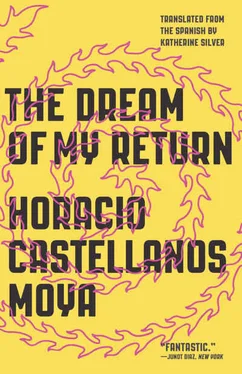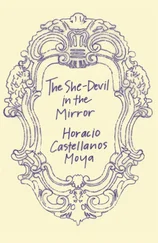Horacio Castellanos Moya
The Dream of My Return
For that which I do I allow not: for what I would, that do I not; but what I hate, that do I.
— Romans 7:15 (King James Version)
You can’t spend your life returning, especially to that cesspool of a country of yours, that disaster they’ve turned your parents’ home into, just so you can say hi or bring us words of consolation.
Here, every act of pity is cruel if it doesn’t set something on fire.
Every sign of maturity must prove its capacity for destruction.
— Roque Dalton, “The Prodigal Son”
IT WAS ONLY AFTER ABSTAINING for five days without any decrease in the pain in my liver that I finally decided to make an appointment with Don Chente Alvarado, a doctor Muñecón had recommended long before but whom I hadn’t yet called, still hoping that my favorite doctor would finally answer the many calls I’d made to him all week without anybody picking up, which made me assume that he and his secretary were both on vacation. It was only when a woman answered and told me that this was no longer Dr. Molins’s office, that in fact Dr. Molins no longer had an office because he had returned to his native Catalonia two months before — which made the pain in my liver go from bad to worse at the mere thought of being hospitalized — that I immediately called Muñecón to get Don Chente Alvarado’s phone number then dialed it to request an urgent appointment.
That afternoon, I made my way to the building where Don Chente lived on San Lorenzo Street in Colonia Del Valle, full of every possible prejudice because I assumed that he was an allopath who would use any pretext to poison me with chemicals and then charge me an arm and a leg for the consultation — according to what Muñecón told me, Don Chente had been one of the doctors most coveted by wealthy Salvadorans before the civil war but had been forced into exile after recklessly treating a wounded man who turned out to be a guerrilla fighter.
I lamented Pico Molins’s sudden departure, convinced that I would never find a doctor like him again: a homeopath who had opened my eyes to the scam of conventional medicine and who always saw me as his last patient of the day, when nobody else was there, not even his secretary, so that he could take all the time in the world to listen to my complaints and then change the subject to Mexican politics — about which he loved to speak with scathing disdain — taking advantage of the fact that I was a journalist to milk me for the latest newsroom gossip, all of which I enthusiastically shared with him, stoking his avid curiosity and satisfying his craving to analyze human stupidity. Pico Molins was delightful, and he never charged me for any of my visits, not even the first one, when I came recommended by a colleague who’d informed him of the extent of my penury, the consequence of my forced residence in a foreign country in order to prevent my compatriots from carving me up into little pieces, as they had so many others.
The fact that Don Chente had money to spare was evident from the very first moment the elevator door opened onto a foyer, which was in fact Don Chente’s private apartment and meant that the entire floor — the penthouse, I should say — was his, quite impressive given the size of the building and the fact that he was the first Salvadoran refuge I had ever met in Mexico who could afford such a luxury, nor was this just any old luxury, as I saw when a uniformed maid greeted me in said foyer and led me to a small sitting room, where, she said, I should wait for Don Chente. I must have spent about three minutes in that room, scrutinizing the décor and listening to the murmurs of a group of women who were probably drinking tea and playing canasta in a room surely less monastic than the one I found myself in, when a short, swarthy, gray-haired old man appeared, dressed in a guayabera and black pants and wearing tortoiseshell glasses that magnified his eyes; he greeted me with a certain formality, gently and very politely telling me what a pleasure it was to meet me and would I please follow him down a hallway, from which I could not catch even a glimpse of the prattling women, in spite of my curiosity-fueled efforts, that’s how big his place was, a hallway similarly decorated in the style of the very wealthy and at the end of which we came to Don Chente’s office, or rather, a spacious library that looked nothing at all like any doctor’s office I’d ever seen, except for the several framed degrees hanging on the wall behind the desk at which Don Chente sat after inviting me to take a seat.
“How can I help you?” Don Chente asked while I was still looking at the bookshelves and staring at the degrees that certified the man in front of me as a medical doctor, a psychologist, and an acupuncturist, a range of knowledge that made a very positive impression on me, allowing me to cherish the hope that I was in the presence of somebody who would soon afford me relief from my pain. But before I set out to describe my ailments, and perhaps upon noticing my amazement at the number of books on the shelves, Don Chente told me that he no longer officially practiced his profession, he was retired and that’s why he didn’t have a doctor’s office per se, this was his library, where once in a while he saw one or another patient, a friend or a friend of friends, in my case, he was seeing me because of his friendship with Muñecón and his fond memories of my father’s family.
“So, tell me. .” he said in a gentle, almost timid, voice as he settled into his chair and placed the palms of his hands together in front of his lips, as if he were about to hear a confession.
And then I told him that I’d been having pain precisely here — pressing on my liver — for about a week, that the pain was constant, which made me fear a serious liver disorder, if not something worse, because a decade earlier some cursed amoebas had infested that organ, which was then further weakened by all the poison I ingested to eradicate them, and, moreover, in the last few weeks, I had to confess, I’d been overdoing it with the vodka tonics, anxious as I was about all kinds of problems that were swarming in on me left, right, and center.
“Are your problems that serious?” Don Chente asked, leaning over his desk to pick up a pen and a notebook, then slowly and deliberately beginning to take notes.
At that very moment, before I started to reveal my misfortunes, I remembered my first appointment with Pico Molins about eight years before, when I anxiously described the pain I was having throughout my abdomen, how an ulcer was about to burst, that’s what I was complaining about when Pico stood up and looked at my iris, then asked me to stick out my tongue, instead of giving me a thorough physical examination, instead of sending me to have tests done, he simply looked at my iris and my tongue, which, needless to say, made me terribly suspicious, above all when he then proceeded to ask me a series of questions that sounded like some kind of children’s game, such as, did I prefer cold or heat, meat or fish, the color red or the color blue — utter nonsense, I thought at the time — and as if that wasn’t enough, he then told me he was going to prescribe some sulfur drops, which I would then have to mix with distilled water in a pewter receptacle and take three teaspoons a day — hell, as if drops were what I needed with all that pain. .
“If you like, we can talk afterwards,” Don Chente said, standing up and indicating that I should follow him into the room where he would examine me, a small room with an exam table, on which I soon lay down after unbuttoning my shirt and pants — I couldn’t hear the murmurs of the tea-drinking women who were playing canasta — and waited for the doctor to pick up his stethoscope to listen to my abdomen,
Читать дальше








![Theresa Cheung - The Dream Dictionary from A to Z [Revised edition]](/books/618735/theresa-cheung-the-dream-dictionary-from-a-to-z-r-thumb.webp)
![Theresa Cheung - The Dream Dictionary from A to Z [Revised edition] - The Ultimate A–Z to Interpret the Secrets of Your Dreams](/books/692092/theresa-cheung-the-dream-dictionary-from-a-to-z-r-thumb.webp)


